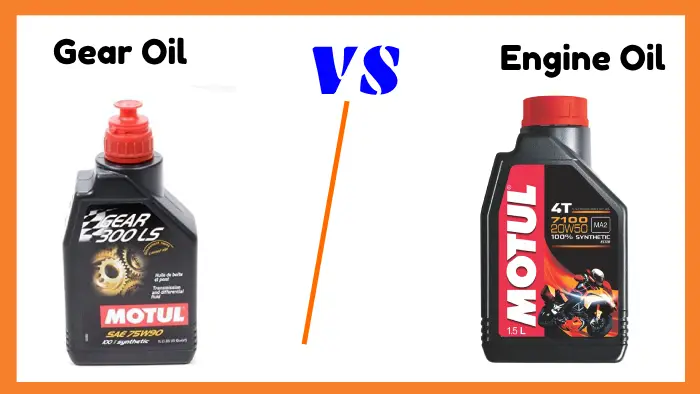Physical Address
304 North Cardinal St.
Dorchester Center, MA 02124
Physical Address
304 North Cardinal St.
Dorchester Center, MA 02124

The choice of lubricants for a vehicle’s essential components is a critical aspect of maintenance that can significantly impact its performance and longevity. Among the various fluids used in automotive systems, gear oil and engine oil stand out as two fundamental players, each tailored to serve distinct purposes.
Gear oil is formulated to lubricate geared systems, withstand high-pressure movements, and optimize friction for smooth gear shifts. In contrast, engine oil is designed to lubricate and cool the engine’s moving components, reduce friction, dissipate combustion-generated heat, and improve fuel efficiency.
Here, I will discuss the key distinctions between the two types of oil, helping you make informed decisions about which one to use. So, let’s dive in and discover the nuances of gear oil and engine oil for your vehicles.

To understand the differences between gear oil and engine oil for vehicles, there are several key points to consider. Here, I listed a few of the most important distinctions from my research:
You need to understand the compatibility between transmission types and the differences between gear and engine oil for your vehicle.
Gear oil is specifically designed to meet the demands of manual transmissions, differentials, and transmission boxes. It has a higher viscosity and contains additives that provide better protection against extreme pressures and temperatures.
In contrast, engine oil is formulated to meet the lubrication needs of all internal combustion engines, regardless of the transmission type. It’s optimized for engine components and contains detergents and dispersants to keep the engine clean and prevent the buildup of deposits.
Gear oil contains additives specifically designed to withstand extreme-pressure conditions commonly found in transmissions and differentials. These additives protect high pressure, ensuring smooth gear shifting and preventing wear and tear on the gears.
On the other hand, engine oil includes detergents and dispersants to combat byproducts from gasoline or diesel ignition, reducing corrosion caused by oxidation and improving fuel efficiency.
According to my knowledge, these additives protect engine components from wear and tear and prevent deposits and sludge from accumulating.
Understanding API ratings is crucial when differentiating between gear oil and engine oil for vehicles. API ratings for gear oils, such as GL-5 or GL-4, focus on their suitability for specific gear applications. These ratings are primarily concerned with providing gear protection and lubrication.
Alternatively, engine oils are rated using API classifications like SL, SN, or CJ-4, designed to assess engine performance and protection. Engine oil ratings consider detergency, discrepancy, and resistance to combustion byproducts.
When differentiating between gear oil and engine oil for vehicles, I think it’s vital to consider the differences in viscosity and cooling properties.
Gear oil has a higher viscosity compared to engine oil, which allows it to withstand extreme pressure and provide lubrication to the moving components of transmissions and differentials. This higher viscosity also helps gear oil to dissipate heat, preventing overheating and ensuring optimal performance effectively.
However, engine oil is specifically formulated to deal with high running temperatures and effectively cool and protect the engine from excessive heat. Engine oil is designed to flow easily through the engine, lubricating all moving parts and removing heat to maintain engine efficiency.
While both oils offer some corrosion protection, gear oil is specifically formulated for superior protection against rust and corrosion. As I know, gear oil contains additives that form a protective film on the metal surfaces, preventing moisture and oxygen from coming into contact with the metal and causing corrosion.
In contrast, engine oil focuses primarily on lubricating and cleaning the internal engine components, with corrosion protection being a secondary function.
Therefore, when choosing between gear oil and engine oil, use gear oil designed specifically to protect your vehicle’s gears and differential from corrosion and rust.
By effectively controlling foam and dissipating shock-loading, gear oil, and engine oil deliver distinct performance benefits in vehicles.
Gear oil formulations are specifically designed to minimize foam formation in geared systems. Foam can lead to reduced lubrication and increased wear, negatively impacting gear performance and lifespan.
The additives in gear oils break down air bubbles and prevent them from reforming, thereby preventing foam formation. This ensures smooth and efficient power transmission in gearboxes.
Then again, engine oil focuses on dissipating shock-loading in the engine. Shock-loading occurs when sudden changes in load or high-impact forces are applied to engine components, such as the crankshaft and connecting rods.
Engine oil contains additives that provide a cushioning effect, absorbing and dissipating these shock loads to protect the engine from damage.
Ensure that the oil grade you choose for your vehicle is compatible with either the gear system or the engine, as gear oil and oil have different requirements.
The recommended gear oil grades, such as 80W-90 or 85W-140, are specifically formulated to meet the demands of gear systems, providing optimal protection and lubrication under high-pressure conditions. These gear oils have additives that help prevent wear, reduce friction, and dissipate heat effectively.
In contrast, engine oil grades, like 10W-30, are tailored to the demands of engine operation, lubricating and protecting high-temperature engine components. Engine oils have additives that enhance engine performance, clean deposits, and protect against wear and corrosion.
You should consider the differences in recommended change intervals between gear and engine oil for your vehicle.
Gear oil typically has longer change intervals, often around 100,000 km, due to its thicker formulation and reduced wear. This is because gear oil is primarily used for lubricating and protecting the gears in the transmission and differential, which experience less stress and degradation than the engine.
Conversely, engine oil change intervals are more frequent, ranging from 7,000 to 15,000 km. This is because engine oil undergoes greater stress and degradation within the engine, where it lubricates and cools various moving parts and helps remove contaminants.
I believe using the wrong oil in your vehicle can have serious consequences for both the engine and the gear system.
If gear oil is used in the engine instead of the recommended engine oil, it can lead to increased wear, reduced fuel efficiency, and potential engine damage. This is because gear oil may not have the necessary additives and viscosity to adequately protect the engine components.
On the other hand, if engine oil is used in the gear system, it can result in inadequate engine lubrication and protection for the high-pressure movements and gear components. This can lead to increased wear and tear, reduced gear performance, and potential damage to the gear system.
| Feature | Gear Oil | Engine Oil |
| Transmission Type | Manual transmissions, differentials, transmission boxes | Internal combustion engines |
| Additives | Extreme-pressure additives for gear protection | Detergent dispersants for engine cleanliness |
| API Ratings | GL-5, GL-4 for gear applications | SL, SN, CJ-4 for engine performance |
| Viscosity | Higher viscosity for extreme pressure in transmissions | Optimized for engine components and high running temperatures |
| Rust & Corrosion Protection | Superior protection against rust and corrosion | Secondary function, with a focus on lubrication and cleaning |
| Foam Control | Minimizes foam formation in geared systems | Not a primary concern, focuses on shock-loading dissipation |
| Shock-Loading Dissipation | Dissipates shock-loading in the gearbox | Cushioning effect in the engine against sudden impact forces |
| Oil Grade Compatibility | Specific gear oil grades (e.g., 80W-90) | Engine oil grades (e.g., 10W-30) |
| Recommended Change Intervals | Longer intervals (around 100,000 km) | More frequent intervals (7,000 to 15,000 km) |
| Consequences of Wrong Use | Potential engine damage, reduced fuel efficiency | Increased wear, reduced gear performance |

Using ATF (automatic transmission fluid) instead of gear oil isn’t recommended for optimal performance and protection of your vehicle’s manual transmission. Gear oil and ATF have different properties and are specifically designed to meet the lubrication needs of different transmissions.
ATF is formulated to provide the necessary lubrication and hydraulic pressure for automatic transmissions, which have different gear arrangements and operate at different temperatures and pressures than manual transmissions.
In contrast, gear oil is specifically designed to withstand the higher loads and pressures experienced by gears in manual transmissions. It has additives that provide better protection against wear, corrosion, and foaming.
While hydraulic and gear oil may appear similar, I realized they cannot be interchanged. Gear oil is designed to provide superior wear protection for gear teeth, preventing early stages of wear that can lead to significant damage.
On the other hand, hydraulic oil lacks these properties and can’t provide adequate wear protection for gear teeth. Attempting to use hydraulic oil instead of gear oil can result in accelerated gear tooth wear, leading to potential transmission failure.
You shouldn’t rely on synthetic engine oil if your vehicle has undergone significant wear and tear, such as reaching around 75,000 miles on the odometer. Synthetic engine oil is designed to provide superior performance and protection for engines in good condition.
However, as engines age and accumulate mileage, they’re more likely to develop internal leaks and consume oil. Synthetic oil has a lower viscosity than conventional oil, which flows more easily. While this benefits newer engines, it can exacerbate oil consumption in older engines.
According to my research, you shouldn’t use engine oil in the differential. Engine oil isn’t suitable for the differential because it’s too thin and lacks the necessary additives.
The sink/phosphorus additives in engine oil aren’t as strong in extreme pressure as the sulfur/phosphorus used in most differentials or industrial gearboxes. Using engine oil in the differential can lead to damage and even complete failure of the differential.
Now you know the differences between gear oil and engine oil. Each of these lubricants is tailored to meet the specific needs of the systems they serve.
Gear oil, engineered to protect and optimize geared components, and engine oil, designed to reduce friction, dissipate heat, and improve combustion, each has its own set of additives, viscosities, and change intervals.
In my view, not following manufacturer recommendations can lead to increased wear and tear and potential damage. Therefore, you must understand the unique roles of gear oil and engine oil and use these lubricants wisely to ensure your vehicle’s health and longevity.
Don’t let your engine or gears suffer from the wrong choice of oil. Give them the care they deserve and enjoy a smooth and efficient ride.
Last update on 2025-07-09 / Affiliate links / Images from Amazon Product Advertising API